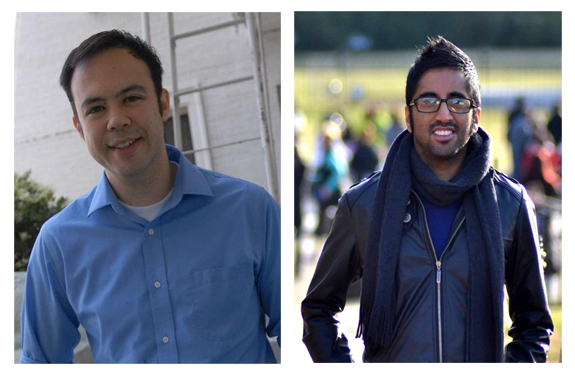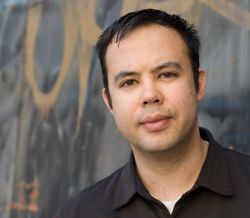
Today, we’re sharing the final installment in our mini series “2 Poets, 4 Questions.” Each week in this series, we’ve been pairing up two different emerging APIA poets and asking them to answer a set of four identical questions. Today’s post features a pair of poet-editors, Neil Aitken (author of The Lost Country of Sight) and Rumit Pancholi (author of the chapbook Anatomy of a Ghost), who reflect on the things that haunt their poetry, putting together their first manuscripts, and the joys and challenges of editorial work.
* * *
1.
LR: What ghosts haunt your poetry? What are the voices and stories that dog you, the specters that find their way into your writing again and again?
NA: Landscapes, mostly. I hold fast to memories of Saskatchewan and the childhood I spent there working in the sun, or wandering through vast fields of grain in the summer, staring up at a sky that refused number or name. I carry all sorts of things with me in my work and in my life. Behind every new city lies an array of the ones I have left behind, large and small—but it’s always the prairies that end up dominating that view: the abandoned farmhouses, the forgotten roads, the fences that run the length of the horizon, everything speaks to something out of time, yet grounded to earth and sensation.
There are people that linger at the edges of my writing as well. My father, for one, now seven years gone into silence, and his voice, which I’ve kept preserved on a little tape recorder, stored in a drawer, waiting for the day I can bring myself to listen to it again. He was my first mentor—the first to encourage me to write, to draw, to imagine things beyond the world around me—and to value the power of language as a means of transformation and possibility. When I teach I find myself falling back on not just on what he taught me, but how—the ways in which he refused easy answers, but equipped me to search out my own.
As a programmer turned poet, I’m haunted the memory of my first encounter with contemporary American poetry, of standing in the aisle of a used bookstore and thumbing through a copy of Philip Levine’s New Selected Poems, and the way “Letters for the Dead” rose from the page and took over my entire imagination. How is it possible, I remember thinking at that time, that one can create so much longing, beauty, and music out of such plain speech? I wanted to write like that—and that yearning has carried me on a remarkable journey, page after page, through the minds and worlds of other great poets.
Lastly, I’m haunted by something the artist Kandinsky once wrote:
“Everything that is dead quivers. Not only the things of poetry, stars, moon, wood, flowers, but even a white trouser button glittering out of a puddle in the street… Everything has a secret soul, which is silent more often than it speaks.”
I love the notion of a secret soul that lurks in even the most mundane and forgettable of things and the way it opens up the space for wonder and surprise, even gratitude.
RP: I’m haunted by the inexorable draws of expectation, especially of Speaker = Poet. Often I feel that creative writers are expected to write, and do write, as I have in my work, about the issues that concern their race/ethnicity, gender, and sexuality—an innocuous trifecta that intersects with love, pain, grief, and other sentiments in modern poetry. Past scholars, instructors, and mentors have given valuable guidance in steering me toward more about my lived experiences as a young, gay non-White writer and to tap into those avenues for creative writing fodder, to dig deep and wide. I have, and the result has been forced, uncooked, and unsatisfying poems that are eventually stashed in a folder on my computer labeled “Pending” only to be sheepishly dropped into the Recycle Bin months later. What was inhibiting me from reaching poems that I could read and reread without sounding standard and cliché? Over the years, I’ve begun to learn and identify that simply writing about those themes doesn’t create the spark I seek. After having written and destroyed hundreds of poems about an unrequited love or a jilted lover or the nuances of growing up constantly responding to gayness, otherness, non-Whiteness, I’m haunted by the “I” Rumit voice versus the “I” speaker voice that has to grapple with being within the poem and apart from the poem while simultaneously being inviting, charming, sexy, relevant to a reader. When I return to those common themes as a springboard, and when I do gain admirable momentum, I ask myself how this poem is different from other same-theme poems written by another “young, gay non-White writer.” That harangues me the most whenever I think I see the Finish Line.
Continue reading “2 Poets, 4 Questions: Q&A with Neil Aitken and Rumit Pancholi”
